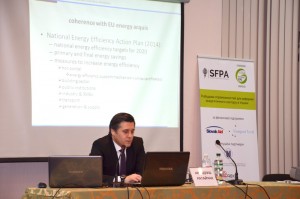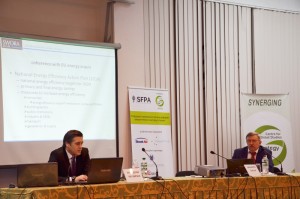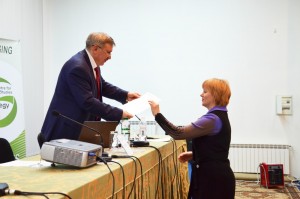Experience of Poland in energy efficiency
17. December 2015 - Kyiv, Artema str. 60, Oil Transportation Institute, conference-hall, 1st floor
The Slovak Foreign Policy Association and the Centre for Global Studies: Strategy XXI (Ukraine), in cooperation with Masaryk University in Brno, the Polish Institute of International Affairs and the Hungarian Regional Centre for Energy Policy Research, invite members of central government, state institutions and specialist education institutions as well as experts to attend a series of seminars on sharing experiences of implementing EU legislation and energy efficiency and renewables programs in V4 countries. The seminars form part of the “Building capacities for energy sector reform in Ukraine” project supported by SlovakAid and the International Visegrad Fund.
Address: Kyiv, Artema str. 60, Oil Transportation Institute, conference-hall, 1st floor.
Timeframe:
- November 26, 2015 – Czech Republic experience
- December 3, 2015 – Slovak experience
- December 10, 2015 – Hungarian experience
- December 17, 2015 – Polish experience
Detailed agenda is available here (in UA).
Warning: Invalid argument supplied for foreach() in /data/7/9/795d260e-a882-4303-97db-7ccfaba621b2/sfpa.sk/sub/archiv/wp-content/themes/twentyfourteen/single-event.php on line 70
On December 17, 2015 the fourth seminar on Polish energy efficiency experiences was held as part of the “Capacity Building for energy sector reform in Ukraine” project implemented by the Research Center of the Slovak Foreign Policy Association in cooperation with the Centre for Global Studies: Strategy XXI (Ukraine) and supported by SlovakAid and the International Visegrad Fund.
Mykhailo Gonchar, president of the Centre for Global Studies: Strategy XXI, officially opened the final seminar in the series on sharing experiences between V4 and Ukraine and introduced Polish expert Arkadiusz Ratajczak, experienced legal counsel and former deputy director of the Department for the Promotion of Competition at the Energy Regulatory Office.
The first session on energy efficiency and government policy including details of the latest developments in policy and legislation was of particular interest to the audience. Having worked for the Energy Regulatory Office, Arkadiusz Ratajczak was able to answer questions about various topics little known to the public, in particular why energy use is being reduced, and provide information on RES tariffs, national energy efficiency, successful and unsuccessful instruments and the challenges ahead.
At the second session, delegates heard about the Polish experience of government engagement in energy efficiency issues, particularly that of ministries and special institutions such as the National Fund for Environmental Protection and Water Management (NFOŚiGW) and the Thermo-modernization and Repairs Fund.
Arkadiusz Ratajczak explained in detail the role of European financial support for energy efficiency, the available financial mechanisms, including how national and EU financial mechanisms work together. This was of great importance for the audience as the Ukraine government has been developing new instruments for accessing and making use of European financial support.
Arkadiusz Ratajczak also gave an in-depth presentation on the role of businesses in energy efficiency projects, the approaches and practices of public-private partnerships, planning energy efficiency national action plans for less than seven-year periods, innovative sources and mechanisms for financing energy efficiency projects, including third party financing, energy performance contracting and energy service companies. He also spoke about the practical lessons learned from dealing with different types of financing, relations between consumers and contractors under various agreements and the effects of energy saving activities. The audience were interested in further information on technical and statistical data and so the dialogue will continue via email.
Discussions continued over lunch and particular interest was expressed in regard to policy making in Poland, the drafting of laws, taking the interests of different industrial groups into account, lobbying activities and comparisons of energy efficiency in different regions.
The afternoon sessions were devoted to practical projects. Arkadiusz Ratajczak gave a presentation on the outcome of projects to modernize public lighting in Jaworzno in 2007, educational institution buildings in Radzionków and public buildings in Karczew. Here the focus was on contractual relations, types of agreements and outcomes. Specific questions about technical solutions were left for further dialog via email.
According to Arkadiusz Ratajczak, Poland has produced several information campaigns through national institutions like the Polish National Energy Conservation Agency and initiatives by local authorities and educational bodies. He stressed that despite great effort a considerable section of the population is indifferent to energy efficiency and concluded that a combination of enforcement and incentive measures were necessary, particularly ensuring children are educated from an early age so energy efficiency becomes part of natural behavior.
The seminar ended with a ceremony at which certificates were awarded to the participants by the President of the Centre for Global Studies: Strategy XXI. In total there were 46 participants from SAEE, NAER and the ministries of energy, regional development, infrastructure, finance, social policy and the environment.
Presentations:
Energy efficiency on the governments policy agenda
How to ensure energy efficiency financing and implementation
Role of private business in energy efficiency projects
Implementation of energy efficiency projects with innovative financing – success cases
Uskutočnené podujatia
Slovenská spoločnosť pre záhraničnú politiku








